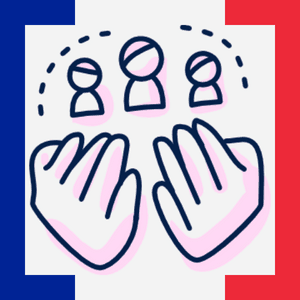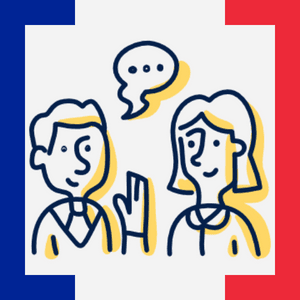French translation
French translation service is necessary for companies that cooperate with France. There are three hundred million French speakers and France is an attractive export market.

Why should you order French translations from Transly Translation Agency?
Excellent French translation
Transly Translation Agency has been awarded the international ISO 17100:2015 quality certificate, meaning that Transly Translation Agency complies with all the requirements for the provision of translation services. The French translation you ordered from us retains the original meaning of the text, contains no mistakes and is natural-sounding to the intended reader. That is why, in the process of translating, we keep in mind the core meaning of the text and convey it in a way that is easy for the reader or user to understand. We firmly believe that a good French translation is one that can easily be understood by your French-speaking business partner, customer, or colleague, regardless of their background and mother tongue. We produce precise and terminologically correct legal translations. To achieve the best results, we will request additional information and review the source text where necessary. If you are looking to tap into the French market, we are able to localise the translation to the French audience – this is especially important when translating websites, marketing texts, safety data sheets and the like.

Swift French translations
We work fast. Thanks to Transly’s excellent technical capabilities, skilled translators, and smooth processes, our translation process is also faster. We always do our utmost to get back to you as soon as possible and the same applies to the preparation of price quotes. If necessary, we can speed things up even more by having several translators working on one project simultaneously. Thanks to rapidly evolving neural machine translation, our working speed also improves. Modern translation software that detects repetitions in a text further helps accelerate our work process. In translating into French, our work process is efficient and flexible and decisions are adopted quickly. Therefore, we can safely say that Transly is one of the fastest translation service providers in the field.

Affordable French translation
Transly offers translations with the best price-to-quality ratio. Our translation projects are carried out using the most modern technologies available and involve both a translator with a master’s degree and a professional editor. Thanks to smart translation software and continuously evolving neural machine translation, we can offer a very competitive price for French translation. We offer a discount on repeated segments in the text. This starts to play a significant role in permanent partnerships: the more similar texts we translate, the lower the unit price becomes for our loyal clients. We translate each segment once, which means you only have to pay for it once as well. This way you can be sure that we are making you the best offer.

Smooth translation process
We are here to make the translation process as smooth and convenient for you as possible. Thanks to our extensive knowledge and experience, we have been able to develop solutions that enable us to manage translations systematically while also making use of translation memories, term bases and a central workflow system. We know that project management entails much more than just organising the translation of a text from one language to another. Having a streamlined workflow is essential in order to guarantee a stress-free ordering experience, transparent budget, and French translations that are completed in due time. For this purpose, we have minimised or automated all time-consuming standard procedures. This way you can be sure that both the budget and the deadline for the translation will meet your high expectations.

Confidentiality guaranteed
We guarantee the confidentiality of all texts. Digital safety, data protection and confidentiality are aspects which we take very seriously in our work. The contract for translation services contains a confidentiality agreement. If necessary, it is also possible to conclude a separate confidentiality contract. The use of translation software and a secure storage server both help reduce the risk of data leaks. Thanks to translation software, there is no need to send files via e-mail, which helps prevent data leaks and misdirected e-mails. Additionally, real-time backup is integrated into our translation process, ensuring that your French translation is in safe hands with us.

All translation-related services from one agency
We want your co-operation with us to be as convenient as possible. We will do our best to accommodate all your translation, editing and content creation wishes as well as those related to these services. Therefore, we also offer a search engine optimisation service for translated websites and a localisation service for online stores. Our services also include translation consulting, assessment of translation quality, voice-over, and dubbing. In addition, we are happy to offer layout, design and printing services for translated texts. This all ensures that you can easily and conveniently find all French translation related services in one place.

Külli
Külli is the Head of Translation at Transly Translation Agency. She has been working as a translator for more than 15 years and has studied translation at Tallinn University. Külli is a perfectionist who is never satisfied with anything less than the optimal result. Her unique ability is her fast-reading skills. She also has extremely good technical acuity and an unerring ability to anticipate upcoming trends.

Transly Translation Agency offers professional translations that save you time and money.
To place an order, send us an email or fill out the enquiry form with the following information:
- What services you are interested in
- Which languages you need the service in
- What the deadline for the job is
Please also include any additional information or a file when submitting your request so that we can analyse it and provide you with an exact quote.
We will get back to you with a quote within an hour.

French technical translation
Technical translation covers areas such as engineering, construction, environmental protection and technology, information technology, transport, automation, etc. The most common types of texts that require technical translation are, for example, user manuals, safety instructions, quick-start guides, setup guides, reports and applications. Technical translation forms a very important part of the services provided by Transly. We translate user manuals and IT-related texts into French, localise applications for the French-speaking market, and offer many other services.

Website translation into French
Website translation is one of our most popular services. A high-quality website translation creates a trustworthy image for your company. That is why we will translate the website of your company into French conveniently, quickly and with quality in mind. Manual copying and pasting of website texts is a thing of the past – we use smart technology to automatically export web texts and import translations. Transly’s French translators and editors have SEO knowledge and, in the process of translating websites, web texts and blog posts, they take strategic keywords into account.

Translation of economic texts into French
The translation of economic texts into French is an important field that includes annual report French translations as well as the French translation of accounting documents, bank statements, proof of payments, and the like. The advantages of using Transly when you plan to acquire French translation of economic texts encompass: knowledge of financial vocabulary and accounting and banking terminology, confidentiality, speed, good communication, and excellent price-to-quality ratio.

Legal translation into French
Legal translation into French involves the translation of contracts, court documents and legislation. With ISO-certified quality processes in place, we produce precise and terminologically correct legal translations into French. Transly complies with strict personal data protection rules and confidentiality requirements, which are especially important in legal translation.

Marketing translation into French
The translation of a marketing text into French can be considered successful when the message is conveyed accurately in French, the translation reflects the values and style of the brand, and, above all, the French translation does not come across as a translation. Translating product descriptions, websites, online stores, overviews, articles, slogans, advertisements, campaign messages, sales offers, company missions or visions, or brand values into French fall under marketing translation into French. In addition to marketing translation, Transly is also an expert in the field of French localisation and transcreation or creative translation into French.

Translation of scientific texts into French
The translation of scientific texts into French is also one of our main services. Our clients include Tallinn University, Tallinn University of Technology, the Estonian Research Council, the Geological Survey of Estonia, the Estonian Environmental Research Centre, the Praxis Center for Policy Studies, and the Estonian Ministry of Education and Research, among many others. In the translation of research articles or doctoral theses into French, we will pay particular attention to relevant terminology and work closely with the client to ensure a quality translation.

Medical translation into French
Medical translation into French involves, among other things, the French translation of user manuals for medical devices, information on medicinal products, patient information leaflets, health files, pharmaceutical research, etc. All our French translations undergo a quality-assurance process pursuant to the ISO standard, ensuring that French translations are accurate, completed on time, and comply with other quality standard requirements. Other advantages of choosing Transly include confidentiality, speed, and an excellent price-to-quality ratio.

Safety data sheet translation into French
A safety data sheet is a document that provides information on how to ensure the safe use of a chemical throughout the supply chain. Since each safety data sheet supplier is responsible for the contents of the safety data sheet, it is best to entrust the translation of safety data sheets into French to Transly Translation Agency. Not only do we translate the text, but we can also identify potential substantive shortcomings or inconsistencies in it. We have extensive experience of translating safety data sheets into French. We always keep up to date with the latest relevant legislation and official terminology, in order to ensure the correctness, clarity and accuracy of your safety data sheet translations.

French localisation
Software localisation is the translation and customisation of a computer program or mobile application for the French market. Software localisation takes into account the preferences, needs and habits of users in France. Software localisation jobs at Transly are entrusted to professional translators who are both tech-savvy and native speakers of French.

French interpretation services
Interpreting, whispered interpreting, remote interpreting, conference interpreting and consecutive interpreting are French translation services that are needed at events, meetings, training courses, notarial transactions, etc. Transly’s French interpreters are highly trained professionals with lengthy experience in a variety of fields. We will help you choose an interpreting service that best meets your needs.

Sworn translation into French
Sworn translation into French is an official document translation service which we offer in co-operation with French-language sworn translators. The French sworn translator assumes liability for the correctness of translation with their signature and seal. If a certified French translation is required, for example, for school admission, travel, or court proceedings, only sworn translators are competent to translate these documents into French.

The best translation is the outcome of human input and technology. Get the finest translation services from Transly Translation Agency.
Translation languages
English-French and French-English translation
English is spoken by 1.5 billion people worldwide! Transly translates websites, user manuals, leaflets, contracts, marketing texts and much more besides into English. We also translate from English into French. Send us a English-French-English translation enquiry!

German-French and French-German translation
It is not easy to redeem yourself in the eyes of a German once you have made a spelling mistake. Transly translates websites, online stores, contracts, marketing texts and much more besides into flawless German. We also translate from German into French. Send us a German-French-German translation enquiry! We will be waiting.

Spanish-French and French-Spanish translation
Did you know that European Spanish and Latin American Spanish are different from each other? Transly translates websites, contracts and much more besides into Spanish. We also translate from Spanish into French. Send us a Spanish-French-Spanish translation enquiry!

Italian-French and French-Italian translation
Italian is spoken by approximately 85 million people around the world. We translate websites, user manuals, leaflets, contracts, marketing texts and much more besides into Italian. We also translate from Italian into French. Send us an Italian-French-Italian translation request! We will be waiting.

Ukrainian-French and French-Ukrainian translation
More than 45 million people speak Ukrainian as a native language. We translate websites, user manuals, leaflets, contracts, marketing texts and much more besides into Ukrainian. We also translate from Ukrainian to French. Send us a Ukrainian-French-Ukrainian translation enquiry! We will be waiting.

Russian-French and French-Russian translation
Did you know that on Russian websites it is good practice to use the formal you instead of the informal you when addressing the reader? Transly translates websites, product descriptions, contracts and much more besides into Russian. We also translate from Russian into French. Send us a Russian-French-Russian translation enquiry!

Swedish-French and French-Swedish translation
More than ten million people speak Swedish. We translate websites, user manuals, leaflets, contracts, marketing texts and much more besides from Swedish-French and French-Swedish. We offer professional Swedish-French-Swedish translations that save you time and money. Send us a Swedish-French-Swedish translation enquiry! We will get back to you within 2 hours.

Finnish-French and French-Finnish translation
More than five million people speak Finnish. Transly translates websites, online stores, leaflets, contracts, marketing texts and much more besides into Finnish. We also translate from Finnish into French. Send us a Finnish-French-Finnish translation enquiry!

Norwegian-French and French-Norwegian translation
Norwegian has a total of 5 million native speakers. Transly translates websites, online stores, leaflets, contracts, marketing texts and much more besides into Norwegian. We also translate from Norwegian into French. Send us a Norwegian-French-Norwegian translation enquiry!

Latvian-French and French-Latvian translation
More than one million people speak Latvian as a native language. We translate websites, online stores, product datasheets, catalogues, marketing texts, documents and much more besides into Latvian. We also translate from Latvian into French. Send us a Latvian-French-Latvian translation enquiry! We will be waiting.

Lithuanian-French and French-Lithuanian translation
More than two million people speak Lithuanian as a native language. We translate websites, user manuals, leaflets, contracts, marketing texts and much more besides into Lithuanian. We also translate from Lithuanian into French. Send us a Lihthuanian-French-Lithuanian translation enquiry! We will be waiting.

Polish-French and French-Polish translation
The Polish language has a total of 38 million speakers worldwide. We translate websites, user manuals, leaflets, contracts, marketing texts and much more besides into Polish. We also translate from Polish into French. Send us a Polish-French-Polish translation enquiry!

Estonian-French and French-Estonian translation
Around one million people speak Estonian as a native language. We translate websites, user manuals, leaflets, contracts, marketing texts and much more besides into Estonian. We also translate from Estonian into French. Send us a French-Estonian-French translation enquiry!

Entrust your translations to us. The eager translators of Transly Translation Agency provide fast and high-quality translations.
Frequently asked questions about French translation
What role does the French language play in the world?
French is a Romance language belonging to the Indo-European language family. There are nearly 150 million speakers of French in the world, half of whom speak it as their mother tongue. This makes French the eighteenth most widely spoken language in the world. French is the official national language of 29 countries, the largest of which are France, Belgium and Switzerland in Europe, the Democratic Republic of the Congo, Madagascar and Cameroon in Africa, Canada, Haiti and Saint-Martin in the Americas, and French Polynesia, Vanuatu and New Caledonia in Oceania. French has retained its position as an official language of many countries as a result of the widespread French colonisation in previous centuries. According to demographic projections, French speakers will number 500 million in 2025 and 650 million in 2050. This means that the number of French speakers is likely to increase several-fold in the coming decades.
How strong is the influence of the French language?
French is an important diplomatic language in the world as one of the official languages of the United Nations, the European Union, NATO, the International Olympic Committee, the European Council, OECD, the Eurovision Song Contest, the European Space Agency, the World Trade Organization and the North American Free Trade Agreement. French is also an important legal language. It is, alongside English, an official language of the European Court of Human Rights. French is taught as the first second language in the United Kingdom, the Republic of Ireland and English-speaking Canada. Since French is the official language of so many organisations, European Union subdivisions and national authorities, it is one of the most widely spoken languages in the world. Besides English, it is the only language in the world that is spoken on every continent.
What kind of texts do you translate from and into French?
We provide French translation of laws, regulations, directives, court judgments, documents, technical texts, medical texts, user and safety manuals, marketing texts, sales materials, catalogues, product documentation, product descriptions, websites, applications, programmes and correspondence. Speakers of French are fewer in number than those of German and of Spanish, for example. This also holds true for French-language translators. However, we work with experienced French translators, who always do their best to ensure that our customers are happy with their translations so that the wait is always worth it.
What should one consider when ordering French translations?
The price of a French translation depends on the exact language pair, the type and function of the text, the format of the source and target text, the desired deadline, and the volume of the text to be translated. If there are recurring segments in the text, we offer regular customers a respective discount. To order a translation, please send us an e-mail along with the text you wish to have translated. If you are unable to provide the text at this point, please indicate the approximate volume of the text. We work with French translators and editors who speak French as a native language, have lived in a French-language environment or have attained the highest level of proficiency in French. Transly translation agency’s translators and project managers are passionate about their job and always do their best to ensure that our customers are happy with their translations.
What makes the French language interesting?
The longest French word is anticonstitutionnellement, which means “unconstitutionally”. French also contains some words with three occurrences of the letter e, such as “créée” (meaning “created”) and “agréée” (meaning “approved”). The longest place name in France belongs to the local authority of Saint-Remy-en-Bouzemont-Saint-Genest-et-Issoni located in Northeastern France, while the shortest place name is that of the village of Y.
What are some interesting French expressions?
Distinguishing, observing and analysing linguistic nuances can tell you a lot about cultural characteristics. Culinary culture and everything related to eating is central in France, as is also evidenced by many French idioms and expressions. When things turn ugly, the French say “tourner au vinaigre”, which directly translates to “turn into vinegar”. When referring to loss of self-control, the French language has the expression “avoir la moutarde qui monte au nez”, which means “to have mustard rising to the nose”. When someone is feeling under the weather, the French say “ne pas être dans son assiette”, which literally translates into “not being in one’s plate”. And when the French want to say “for next to nothing”, they use the expression “pour une bouchée de pain”, which means “for a mouthful of bread”. All these words – vinegar, mustard, bread and plate – are related to food.
What should one consider when entering the French market?
The French language is at once proud and modest, sensual and formal, resounding and soft. This applies equally to the French themselves. France has been the birthplace of many corporations that have spread across the globe and are active in fields such as medicine, agriculture and the food industry. The French market is also an attractive export market. When entering the French market, your progress will be smoother and you will be more likely to succeed when playing by the local rules.
- Politeness is important! Address others politely by using the title Monsieur or Madame and both their first name as well as their surname.
- Keep your handshakes light! The French shake hands very loosely and lightly, as if they are always in a hurry. Thus, a loose handshake by a Frenchman or woman should not be taken as a lack of interest.
- Clothing is important! Clothing should be of high quality, jewellery should be tasteful and any accessories should be expensive. Trainers are out of the question and turning up to a business meeting unshaven is not a good idea either.
- Hands on the table! Business lunches are common in France. Business lunches can last hours, but business is not discussed until after dessert. As a rule of proper etiquette, hands should be kept on the table during the lunch, not under the table.
- Pressuring is a bad idea! Aggressive sales tactics will not get you far in France. The decision-maker is the most senior ranking executive and decisions take time. Have patience.
- Interrupting others is polite! Interrupting others with a question or finishing their sentences is considered polite in France, because it shows that the listener is interested in the subject. It is a good idea to interrupt the speaker with a question as a show of support.
What kind of texts do you translate from and into French?
We provide French translation of laws, regulations, directives, court judgments, documents, technical texts, medical texts, user and safety manuals, marketing texts, sales materials, catalogues, product documentation, product descriptions, websites, applications, programmes and correspondence. If desired, we also offer our customers translation layout, design, insertion into websites and printing services. If you have a translation request, please send us an enquiry and we will provide you with a quotation within just a couple of hours.
Read more
TRANSLY TRANSLATION AGENCY, TRANSLATION, EDITING, CONTENT CREATION, FULL-SERVICE TRANSLATION, ABOUT US, TRANSLATION SERVICES

Out of office message in English, Finnish, Estonian, Russian, German, Lithuanian and Latvian

How do you choose a translation agency?













